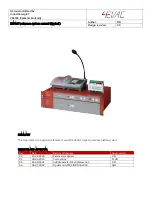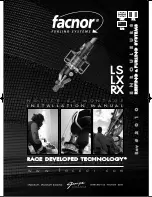
General Guidelines
Recommended
Kits
To use the Neon
™
device for electroporation of mammalian cells, you need to
purchase the Neon
™
Kits from Invitrogen. Ordering information is on page 38.
Do not
use any other kits with the unit.
R
E
C
O
MM
ENDA
TI
O
N
To obtain the best results, follow these recommendations:
Based on your initial results, you may need to optimize the electroporation
parameters for your cell type and DNA/siRNA. A preprogrammed 24-
well optimization protocol is included in the device for your convenience.
Before using the device with your samples, ensure that you are able to
insert and use the Neon
™
Pipette and Tip correctly into the Neon
™
Pipette
Station (see page 14 for details).
Wear gloves, laboratory coat, and safety glasses during electroporation.
Always use the Neon
™
device with Neon
™
Kits for electroporation of
mammalian cells.
The Neon
™
Transfection System is compatible for use with most
mammalian cells including primary and stem cells.
Use high quality DNA and siRNA to obtain good transfection efficiency.
Follow the guidelines on pages 16–17 for cell preparation.
Use an appropriate GFP (green fluorescent protein) construct or siRNA
control (see next page for details) to determine transfection efficiency.
Discard the Neon
™
Tips after 2 usages and Neon
™
Tubes after 10 usages as
a biological hazard. We strongly recommend changing tube and buffer
when switching to a different plasmid DNA/siRNA or cell type.
Visit www.invitrogen.com/neon for a library of electroporation protocols
for commonly used cell types.
Recommended
Buffers
The Neon
™
Kits contain two Resuspension Buffers. Use the appropriate
Resuspension Buffer based on the cell type as below. The cell-specific Neon
™
transfection protocols available on
indicate the
type of Resuspension buffer for use with each cell type.
Resuspension Buffer R:
Use Resuspension Buffer R with
established adherent and suspension cell
lines
such as 3T3-L1, HEK293, Cos7, C2C12, HeLa, HCT-15, PC-12, MDCK,
Raw264.7, U-2OS, CEM, HL-60, K-562, Jurkat, LCL, Ramos, U-937, as well as
primary adherent cells
such as neuronal cells, stem cells, hepatocytes,
HUVEC, macrophage cells, dendritic cells.
Resuspension Buffer T:
Use Resuspension Buffer T with
primary blood-derived suspension cells
such
as T-cells, B-cells, NK cells, PBMC, monocytes.
Continued on next page
12
















































